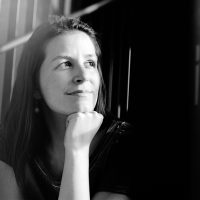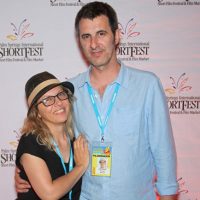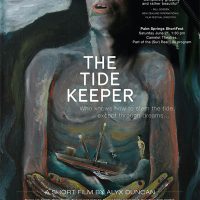
By Heidi Simmons
After filmmakers arrive and check in with Palm Springs International Short Film Festival & Film Market at the Renaissance Hotel, they mostly gather at the Stella Artois Hospitality Lounge. Between screenings and industry events, the lounge is a relaxing place to mangé, mingle and meet. Generous sponsors provide free snacks and drinks, while kindly ShortFest volunteers dote on the filmmakers.
At the beginning of the Fest, there is a low murmur of activity with polite introductions and by its finish, there is a ruckus of camaraderie with hardy laughter and intense conversation.
Scan across the full room and it is a colorful, yet homogenized group. Visually, there are no discernable clues to tell the foreigner from the American filmmaker at this international event. Even accents are surprisingly slight as English has become a universally spoken language.
What is noticeable among this creative mix is that there appears to be an equal male to female ratio of filmmakers. If forced to count, there may actually be more women gathered in the room than men.
But statistics shared during an industry panel discussion said that in America only six percent of filmmakers are women. While in Europe, women filmmakers make up 16 percent. For the rest of the world, there are no numbers. But at this short film fest, there are a number of women from around the globe with something to say.
Here is a brief example of what women in the world are putting on film.
Lendita Zeqiraj is from Kosovo. She is the writer and director of “Balcony.” A 20-minute film about a boy who torments his neighbors and passers-by as he balances precariously on his high balcony and the way the community tries to figure him out and resolve the situation.
In this charming film, a cross section of concerned citizens’ give their opinions not only about the child’s rescue, but also about the trouble with society all the while looking up at the dangling kid. With a cast of 22 actors, Zeqiraj seamlessly moves the camera through the growing crowd in one astonishing sequence.
“Balcony” is Zeqiraj fourth film and it has been in 48 film festivals. Although Zeqiraj and her husband, producer Bujar Kabashi have only personally participated in four festivals, they saved their money to attend Palm Springs ShortFest because of its international importance and quality. At there own expense, they flew 20 hours on three planes to get here. They stay the entire week to participate in discussions, panels and roundtable events. “We love it here. It is the best,” said Zeqiraj. In Kosovo there is only one theater!
From Germany, Julia Walter is writer and director of “Job Interview.” A second year student at the University of Television and Film, Munich, it is her second film. The 10-minute movie is about the perfect job opportunity that indeed is too good to be true. In the stark psychological thriller, a woman finds herself in the midst of something troubling and finally deadly.
“Job Interview” has been in 20 festivals and won two awards. Walter has personally participated in seven festivals. She spent 30 hours on three planes to get to Palm Springs. “It is totally worth it,” she said. “I stay all week and make the most of the event.”
Walter is staying in Palm Springs with other German filmmakers attending the ShortFest. Together they rented a house to help save on expenses.
Sara Seligman is director and co-writer of “Diego.” Shot in Mexico, the story is of a young boy, who is accused of being a coward, but rejects the violence and brutality of his family’s day-to-day existence and bravely frees a kidnapped girl without consideration to his own welfare.
Seligman attended film school in New York and wanted the story to be authentic. Without her film school buddies, she put together a crew of friends and family in Mexico where she was born and raised. The film is 18 minutes long. Seligman lives in Los Angeles and is writing a feature length screenplay.
Faye Gilbert took two planes and traveled 13 hours to bring her 21-minute thriller “The Line” from the United Kingdom for its world premiere.
Writer and director, Gilbert’s story is about a reluctant young woman desperate to get a “special” child back to his father at great risk to herself and the boy. During her arduous journey, she will do whatever it takes, even kill, to keep her promise in a dark and dangerous world. The film leaves the viewer trembling and asks: What lines would you cross to get your child back?
Out of film school for 15 years, Gilbert has made seven short films. Writing, directing and producing, she has managed to make two films a year. After participating in a ShortFest Roundtable event with industry professionals, Gilbert said, “I’m encouraged to think more about story telling and creative content. I learned it’s good to take a step back and focus on short-term projects rather than focus on long-term film goals. What clicked for me is that it’s okay to take risks.”
New Zealander, Alyx Duncan is writer, director and producer of “The Tide Keeper.” A world premiere, this beautiful live action, animated 9-minute short follows an old man whose dream of saving the oceans and tide pools becomes a nightmare as he is suffocated by the trash and debris he long fought. The battle seems lost and it is the horror that his life’s work has had no positive impact on the ocean.
Duncan studied dance for ten years and has choreographed several films. “The Tide Keeper” is the second film she wrote, directed and produced. Duncan’s trip from New Zealand took 14-hours.
American filmmaker Lisa Melodia filmed her story “Big Girl” in New York. Exquisitely directed, the story follows a six-year-old girl who just wants to go to school, but her mother has other plans. As each scene quietly unfolds, there is something far more serious at hand. The girl’s mother has another agenda and it will require the little girl to grow up a little faster than she wants.
“Big Girl” has been in three festivals so far this year. Palm Springs is the film’s west coast premiere. In 2011, Melodia’s first film “Confidante” starred Gaby Hoffman. Naturally talented, Melodia thought instead of spending money for film school, she would use it instead to make movies. “When I was young, my mom and I would watch lots of movies together,” said Melodia. “I love movies and incorporate what I like into my films.”
Women filmmakers were present from all over the world including Australia, Azerbaijan, Mozambique, Spain, China and Columbia. With 37 countries represented in the 2014 ShortFest, more women are writing, directing and producing films every year.















































